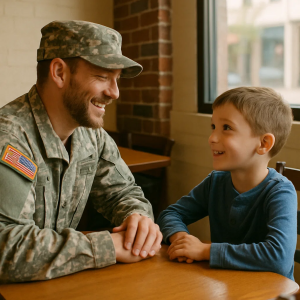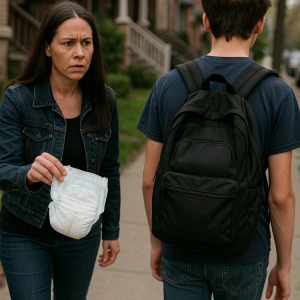Three days after a nasty tumble down a steep flight of stairs, Michael Carter stepped onto the evening train, his right arm immobilized in a crisp white plaster cast. The doctor had reassured him that the fracture was clean, but the dull, insistent ache beneath the painkillers still pulsed like a low drumbeat in the background. The injury wasn’t the only burden—it was the helplessness that weighed on him more heavily. Simple tasks became slow ordeals, and he hated having to depend on strangers to help carry his bags or open a door.
His plan was straightforward: ride out to his parents’ quiet countryside home, get proper rest, eat well, and recover without the constant noise of the city. He had gone out of his way to reserve a lower berth in the train compartment—climbing to an upper bunk with a broken arm was out of the question.
Michael arrived early, slid his bag under the seat, and settled in. The station platform slipped from view as the train lurched forward into the evening.
That was when the compartment door slid open.
A woman in her mid-fifties entered. Her attire was immaculate—tailored jacket, pearl earrings, a scarf that looked imported from somewhere expensive. Her hair was perfectly arranged, her lipstick sharp and deliberate. She had the air of someone used to being noticed, someone who expected others to make way for her without question.
Her gaze swept the compartment before landing squarely on Michael. She didn’t smile. She didn’t greet him. She simply looked from his seat to his ticket to his face, as if appraising whether he had the right to be there at all.
And then, without preamble, she announced, “Young man, I always take the lower berth. Be a gentleman and give me your seat.”
Michael blinked, lifting his cast slightly as if it might explain everything without words.
“I’m sorry, ma’am,” he said evenly. “I have a broken arm. I booked this berth specifically because I can’t climb to the upper one.”
But she wasn’t interested in reasons.

Her voice sharpened and rose just enough to carry into the corridor. “Shocking! Absolutely no respect for elders these days. You see a lady and yet you lounge there like you own the place. Where are your manners?!”
Michael could feel eyes turning toward the compartment. Heads poked in. She was performing—crafting a scene for an audience.
And then he noticed something else: a man, perhaps in his early forties, had stepped in behind her. He wore a designer watch, Italian leather shoes, and an expression that was more smirk than smile. The woman’s glance flickered toward him, and suddenly Michael understood—this was less about a seat and more about showing off in front of her new traveling companion.
When Michael refused again, she huffed theatrically and plopped herself down across from the man. Almost instantly, her tone changed. The scolding melted into light laughter. She leaned toward him, complimenting his shoes, adjusting her scarf with an almost girlish toss of her hair.
Michael said nothing, though his arm throbbed and his jaw clenched. And then, an idea began to form—something quiet, deliberate, and far more effective than matching her theatrics.
He reached into his bag, took out his phone, and pressed record.
“Ma’am,” he said clearly, “I’ve documented everything. Your demand that I give up a medically necessary seat. Your refusal to acknowledge my injury. And your attempt to publicly shame me for not moving.”
Her smile vanished. The hand that had been adjusting her scarf froze mid-air.
“And,” Michael added, his eyes flicking briefly to the tote bag at her side, “I see your bag has an official Ministry of Education emblem on it. Imagine how your colleagues might react if they saw how you treated someone with a disability. Especially while on a public journey.”
Color drained from her face. The man beside her shifted uncomfortably and slid a few inches away. The flirtation had evaporated completely.
“I—I didn’t mean it like that,” she murmured, her voice now small and hesitant. “You’ve misunderstood…”
“I hope,” Michael said quietly, “that next time you choose your words more carefully—and treat strangers with a little more decency.”
He ended the recording, slipped the phone back into his bag, and turned to watch the scenery slide past in a blur of twilight colors. The clatter of the train on the tracks filled the silence.
For the remainder of the journey, she didn’t utter another word. No more complaints. No attempts to draw attention. She sat rigid in her corner, as if hoping to disappear into the upholstery.
Michael didn’t speak again either. His arm still ached, but inside he felt something steadier—something almost like peace.
Sometimes it doesn’t take shouting to put someone in their place.
Just calm. And precision.
Even with one working arm, Michael had managed to deliver a lesson she wouldn’t soon forget.









